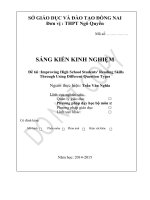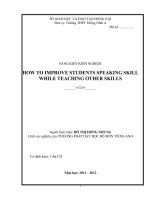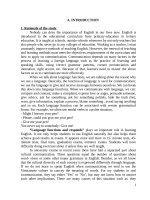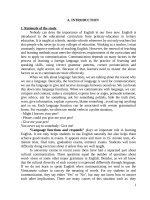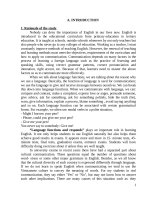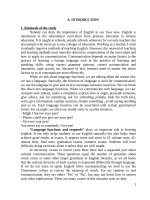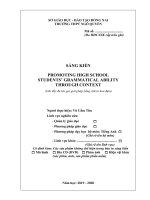skkn improving high school students’ speaking skill through role play
Bạn đang xem bản rút gọn của tài liệu. Xem và tải ngay bản đầy đủ của tài liệu tại đây (428.54 KB, 29 trang )
SỞ GIÁO DỤC VÀ ĐÀO TẠO ĐỒNG NAI
Đơn vị : THPT Ngô Quyền
___________________
Mã số: …………………..
SÁNG KIẾN KINH NGHIỆM
Người thực hiện: Trần Văn Nghĩa
Lĩnh vực nghiên cứu:
Quản lý giáo dục
Phương pháp dạy học bộ môn
Phương pháp giáo dục
Lĩnh vực khác:
Có đính kèm:
Mô hình
Phần mềm
Năm học:
Phim ảnh
2012-2013
Hiện vật khác
SƠ LƯỢC LÝ LỊCH KHOA HỌC
__________________________
I. THÔNG TIN CHUNG VỀ CÁ NHÂN
1. Họ và tên:
Trần Văn Nghĩa
2. Ngày tháng năm sinh : 20-11-1963
3. Nam/Nữ: Nam
4. Địa chỉ: B 28-Khu Phố 6- Tam Hiệp- Biên hòa
5. Điện thoại: 0913130131 Cơ quan:
6. Fax:
Nhà riêng:
E-mail:
7. Chức vụ: Tổ trưởng
8. Đơn vị công tác: THPT Ngô Quyền
II. TRÌNH ĐỘ ĐÀO TẠO
- Học vị (hoặc trình độ chuyên môn, nghiệp vụ) cao nhất: Thạc sĩ
- Năm nhận bằng: 2001
- Chuyên ngành đào tạo:
Giảng dạy tiếng Anh
III. KINH NGHIỆM KHOA HỌC:
- Lĩnh vực chuyên môn có kinh nghiệm:
- Số năm có kinh nghiệm: 20 năm
- Các sáng kiến kinh nghiệm đã có trong 5 năm gần đây:
Making speaking tasks more effective and easier for high school students
How to increase high school students’ oral communication .
Teaching English through oral communication.
Improving High School Students’ Written Competence Through
Teaching Grammar in Context
SỞ GD & ĐT ĐỒNG NAI
CỘNG HÒA XÃ HỘI CHỦ NGHĨA VIỆT NAM
Đơ Đơn vị: THPT Ngô Quyền
Độc lập - Tự do - Hạnh phúc
- ---------
______________
Biên H òa, ngày 15 tháng 4
năm 2013
PHIẾU NHẬN XÉT, ĐÁNH GIÁ SÁNG KIẾN KINH NGHIỆM
Năm học: 2012-2013
Tên sáng kiến kinh nghiệm: Improving
High School Students’
Speaking Skill Through Role- play
Họ và tên tác giả: Trần Văn Nghĩa
Đơn vị (Tổ): Tiếng Anh
Lĩnh vực:
Quản lý giáo dục
Phương pháp dạy học bộ môn
Phương pháp giáo dục
Lĩnh vực khác
1. Tính mới:
- Có giải pháp hoàn toàn mới
- Có giải pháp cải tiến, đổi mới từ giải pháp đã có
2. Hiệu quả:
- Hoàn toàn mới và đã triển khai áp dụng trong toàn ngành có hiệu quả cao
- Có tính cải tiến hoặc đổi mới từ những giải pháp đã có và đã triển khai áp dụng trong
toàn ngành có hiệu quả cao.
- Hoàn toàn mới và đã triển khai áp dụng tại đơn vị có hiệu quả cao
- Có tính cải tiến hoặc đổi mới từ những giải pháp đã có và đã triển khai áp dụng tại
đơn vị có hiệu quả
3. Khả năng áp dụng:
- Cung cấp được các luận cứ khoa học cho việc hoạch định đường lối, chính sách:
Tốt
Khá
Đạt
- Đưa ra các giải pháp khuyến nghị có khả năng ứng dụng thực tiễn, dễ thực hiện và
dễ đi vào cuộc sống:
Tốt
Kh á
Đạt
- Đã được áp dụng trong thực tế đạt hiệu quả hoặc có khả năng áp dụng đạt hiệu quả
trong phạm vi rộng
Tốt
Khá
Đạt
XÁC NHẬN CỦA TỔ CHUYÊN MÔN
(Ký tên và ghi rõ họ tên)
THỦ TRƯỞNG ĐƠN VỊ
(Ký tên, ghi rõ họ tên và đóng dấu)
Ngo Quyen High School
School Year:2012-2013
_______________
Action Research Proposal
Research Title:
Improving High School Students’ Speaking Skill
Through Role- play
Researcher : Tran Van Nghia
Due Date : 15 May 2013
Improving High School Students’ Speaking Skill Through Role- play
Abstract
My special interest in the topic of improving students’ speaking skill through roleplay began when I listened to a lecture on the importance of role-play to the teaching
and learning of speaking skill at a conference in Ho Chi Minh City University of
Education, Vietnam. As an attempt to improve high school students’ speaking skill, I
will carry out this mini-research with empirical methods in the expectation that I can
make an innovation in English language teaching and learning at Ngo Quyen High
School, where I have been working as a teacher of English for over 20 years .
The purpose of this action research is to explore the effect of using role-play on the
development of grade 10 and grade 11 students’ speaking skill at Quyen High School.
The study also aims to identify students’ problems with the expectation that role-play
will help improve their speaking skill. The research project
includes a short
introduction , a review of current literature related to the definition of role-play, its
advantages as well as disadvantages, a description of
data collection and data
analysis methods in which the students will be provided with a questionnaire on their
speaking styles, learning habits, preferences
and their views on role-playing
activities .The final parts of the research paper are sections discussing on anticipated
outcomes and possible problems occurring during the research project together with a
brief conclusion and some limitations of the action research proposal .
Introduction
Dong Nai is an industrial and commercial province in the South of Vietnam, where
there are many foreigners who come to invest in the property market, to work in
industrial zones and to do international trading. Most foreigners use English to
communicate with their colleagues, office workers, local residents; and English is a
very important foreign language for people at work and young students in the
province.
In this province, there are fifty high schools with the responsibility for teaching and
training students to become competent English users so that they can continue their
higher studies at universities or get employment in the industrial zones. Therefore,
most teachers and parents are aware of the social needs of English as well as the
importance of English to real-life communication. In fact, many people in the
province try to study English in order to have better jobs in multi-national companies
or corporations and to get promotions in their careers.
Among the high schools in the province, Ngo Quyen High School is one of the
prestigious ones in Bien Hoa City, the commercial heart of Dong Nai Province, where
I have been working as a teacher of English for over 20 years. Each year, this school
has over one thousand students who are good at various subjects, such as
mathematics, chemistry, physics and biology, but their oral communication skills are
not good enough. Like students in other high schools in Vietnam, the students in this
school have to take English as a compulsory subject in the curriculum and study it
three periods a week (1 period = 45 minutes) for 34 weeks a year. The course aim,
according to the curriculum, is to help the students develop the four language skills:
listening, speaking, reading and writing.
In informal discussion with many grade 10 and 11 students, I know that they really
want to learn English for communication, especially oral communication. However,
they have very few learning strategies, especially strategies for improving speaking
skills. Contrary to my expectation, what they often do in the speaking class is to copy
vocabulary and language structures the teacher already writes on the board. They then
translate everything into Vietnamese before completing exercises and tasks in their
textbooks, or answering the teacher’s questions based on reading texts. I am also
aware that they got into this habit of learning when they were at secondary schools.
Actually, this way of learning hinders their learning progress.
As a teacher of English as well as a researcher, I recognize that teaching English for
oral communication is particularly important. However, my personal experience of its
methods or techniques is still limited due to the following reasons:
The number of students of each class in most schools in Vietnam as well as in my
province is over 40. Besides, because of time limitations, the teacher would
sometimes make use of grammar translation methods or lecturing methods for the
sake of input completion. Therefore, the students have very few opportunities for
communication; and they do not get familiar with natural responses to communicative
situations except for question- answer activities between the teacher and student
individuals. For the above reasons, the students lack confidence and creativity to state
their opinions and to express themselves in English.
As a researcher, I know that there are a number of things that need innovations.
However, in this research the focus of my investigation is on the students’ speaking
skill because speaking, in my personal opinion, is the most important of the four
language skills. According to Ur (1996,p.120) , “Of all the four skills (listening,
speaking, reading and writing), speaking seems intuitively the most important: people
who know a language are referred to as “speakers” of that language, as if speaking
included all other kinds of knowing; and many if not most foreign language learners
are primarily interested in learning to speak”. She also emphasizes that classroom
activities that develop learners’ ability to express themselves through speech would
therefore seem an important component of a language course.
As an attempt to improve grade 10 and grade 11 students’ speaking skill, I will carry
out this mini-research with empirical methods .The purpose of this action research is
to investigate the effect of using role-play on grade 10,.11 students’ speaking
development at Ngo Quyen High School. The study also aims to identify students’
problems with the expectation that role-play will help improve their speaking skills.
Finally, the study will investigate students views on role-play activities.
In this action research, I would like to apply what I have acquired in order to improve
teaching practices at my school and other schools in the province. In my own
experience of teaching and from what I have read in some very useful books during
the time I have learned in Singapore, I believe that role-play will help my students
learn speaking more effectively. More importantly, there is a great need for changes to
be made in the teaching of speaking in my school.
This study will be of great value to the principal, vice- principals, students and
teachers in Ngo Quyen High School. As a researcher, I do have a role to play in
improving both standards and the quality of teaching and learning English in my
school. My expectation is that the research will help teachers in my school make a
change in teaching English, particularly in speaking skills. Last but not least, the
findings will be passed on to teachers in other high schools in my home province. This
research will make a valuable contribution to the teaching and learning of English in
Dong Nai, an industrial and commercial province where there is a tendency to apply
new English teaching methods in order to promote students’ spoken communication.
The research focus will be formulated into the three questions as follows :
1. What is the effect of role-play on the development of Grade 10, 11 students’
speaking skill?
2. How can role play be used effectively in speaking classes ?
3. What are students’ views or opinions on role-play?
Literature Review
The purpose of the study, as presented above, is to investigate the effect of role-play
on the development of students’ speaking skill. The first thing that will be discussed is
a brief review of literature concerning the definition of role-play and simulation. The
second part will look at the advantages of role-play to teaching speaking . Next is an
analysis of disadvantages of role-play; and finally there will be a short discussion on
effective ways of using role-play in teaching speaking.
Many studies have been carried out in order to explore the advantages and
disadvantages of role-play in teaching speaking; and the findings revealed that roleplay is an effective way to develop students’ communicative competence, especially
the sociolinguistic and strategic competence (Canale & Swain,1980). In defining
“Role-play”, Ur (1996) says that role-play is used to refer to all types of activities in
which students assume themselves in a situation outside the classroom.
In explaining the effective use of role-play, Littlewood ( 1992,p.91) also points out
that “ It is not only in the classroom that we perform roles . We are doing so all the
time in our daily life : in our jobs we perform the role of teacher , perhaps also
supervisor or head of department ; at home we may perform the role of parent
,daughter or son ; in other contexts we may perform the role of acquaintance, stranger
, novice or expert ; and so on” .
In considering the benefits of role play, Larsen-Freeman( 1986) says that role-play is
very important in the Communicative Approach because role-play provides students
with an opportunity to practice communicating in different social contexts and in
different social roles. In recommending the techniques of using role-play, he adds that
role-play can be set up so that it is very structured (for example, the teacher tells the
students who they are and what they should say ) or in less structured way ( for
example, the teacher tells the students who they are, what the situation is , and what
they are talking about, but the students determine what they will say).
It is important that the teacher should encourage students to produce language
outside the classroom as much as possible. By using role play students are given
opportunities to use their target language . Littlewood (1983 ) emphasizes that
provided that students are able to identify with the roles assigned to them , roleplaying therefore provides opportunities for students to climb into the kinds of
linguistic behavior-patterns which they will need to produce outside the classroom and
to integrate these behaviour-patterns with their own personalities.
In agreement with Littlewood, Harmer (2001,p.274 ) emphasizes that ‘Many students
derive great benefit from simulation and role-play. Students ‘simulate’ a real life
encounter (such as a business meeting ,an encounter in an aero -plane cabin ,or an
interview ) as if they were doing so in the real world ,either as themselves in that
meeting or aero-plane, or taking on the role of a character different from themselves
or with thoughts and feelings they do not necessarily share’. He also adds that
simulation and role-play can be used to encourage general fluency, or to train students
for specific situations especially where they are studying ESP. Similarly, Littlewood
(1992,p.91) emphasizes that “The concept “role” is a useful one because it can link
what takes place in the classroom with what takes place outside it”.
Apparently, role-play can make classroom activities more natural and interesting.
Brand and Donato (2001) stress that if we assign students roles or allow them to
select the ones that are different from their own life roles we help them to understand
others’ points of view. They also state that conversely, role-playing their own life
roles may help them and other classmates to look more objectively at themselves and
their situations. According to Dave Willis and Jane Willis (2007), the advantage of a
role play is that it mirrors our life. They explain that if students are assigned trainee
travel agents, they can see themselves dealing with customers, answering questions
and helping to solve their problems.
In contrast, role-play has some problems that should be considered. According to Ur
(1996) some teachers’ attitudes to role-play vary due to their personalities and
backgrounds. Some teachers are enthusiastic, but others are reluctant to use role-play.
She suggests that we, as researchers, should help those teachers get familiar with
using role-play by trying out an activity with them as an introduction to the unit. Also,
we must clarify that role-play activities can contribute to oral fluency. Dave Willis and
Jane Willis (2007) also point out the disadvantage of role-play that a role play
imposes an unnecessarily heavy load on students. It asks them not only to solve the
problem, but also to act out a role while doing this. In recommending how to solve the
problems, they suggest that teacher should take students through a sequence in which
they first solve a problem, then learn to play a role, and finally learn to solve problems
while playing a role. They emphasize that by doing this, teachers can separate out the
difficulties, allowing students first to concentrate on the problem, and then on the
social context.
As Larsen-Freeman pointed out in her book "Techniques and Principles in Language
Teaching", "Role-play is very important in the Communicative Approach because role play
gives students an opportunity to practice communicating in different social contexts and in
different social roles." (Larsen-Freeman, p. 137) .In my own experience of teaching in order
to help students improve their listening, speaking and communicative skills, I have designed
and conducted several role play activities for my students to practice and use English in a
more meaningful way as a practical language, and the results of my students' learning are
quite positive.
In comparing the advantages and disadvantages of role-play, I believe role-play can be
used in all the stages of the speaking process from pre-speaking to post-speaking.
Within the scope of my action research proposal, the research focus is on the
application of effective techniques of teaching speaking with role-play. My
expectation is that the findings of this action research will help me make
improvements in teaching speaking in my school. The following is some important
steps to conduct role-play suggested by Larsen-Freeman.
For the role play activities in my classes, there are six major steps in the procedure.
STEP 1: Decide on the Teaching Materials
The teacher should decide which teaching materials will be used for role play activities. The
teaching materials can be taken from text books or non-textbook teaching materials such as
picture books, story books, readers, play-scripts, comic strips, movies, cartoons and pictures.
The material is selected ahead of time by the teacher. The teacher can also create his or her
own authentic teaching materials for role play activities. The teaching materials must be
decided based on students' level and interests, teaching objectives and appropriateness for
teaching
STEP 2:Select Situations and Create Dialogs
Then a situation or situations to be role played should be selected. For every role-play
situation, dialogs should be provided (by the teaching materials or by the teacher) or created
by the students themselves.
STEP 3:Teach the Dialogs for Role Plays
The teacher needs to teach the vocabulary, sentences, and dialogs necessary for the role play
situations. The teacher needs to make sure the students know how to use the vocabulary,
sentences and dialogs prior to doing the role play activities, otherwise, the teacher should
allow students to ask how to say the words they want to say.
STEP 4: Have Students Practice the Role Plays
Students can practice in pairs or in small groups. After they have played their own roles a few
times, have them exchange roles. That way, students can play different roles and practice all
of the lines in the role play. When students are confident enough to demonstrate or perform in
front of the class, the teacher can ask them to do so for their classmates.
STEP 5:Have Students Modify the Situations and Dialogs
Once students have finished and become familiar with an original role play situation, they
can modify the situations and/or dialogs to create a variation of the original role play.
STEP 6: Evaluate and Check Students' Comprehension
Finally, the teacher will evaluate the effectiveness of the role play activities and check if
students have successfully comprehended the meanings of the vocabulary, sentences and
dialogs. There are several ways to do student evaluations. Students can be given oral and
listening tests relating to the role plays. Example oral tests can include the following.
Students are asked to answer some simple questions related to the role plays.
Students are asked to reenact the role plays.
Students are asked to translate the role plays into their native language if necessary
For listening tests, beginning students can do simpler tasks such as: "listen and circle", "listen
and number", "listen and match" types of questions. For more advanced students, they can be
asked to write the words, lines, and/or dialogs in the role plays. They can also be asked to
create and write variations of the role plays. Teachers can also evaluate students'
understanding and comprehension while observing students' interactions, practices, and
performances of their role plays.
Methodology
Research Questions
Research
Subjects
Tools of Analysis
Instruments
1. What is the effect of -Oral Pretest
role-play
on
-Grade
10,
the -Oral Post-test students
11 -Frequency
count
development of Grade -Observation
-Age:16-17
-Percentage
11 students’ speaking
English
- Transcription
skill?
proficiency:
2. How can role-play be
Intermediate-
used
Site : Ngo Quyen
effectively
in
speaking classes ?
High
School,
Dong
Nai
Province
-Sample size: 60
3.What are students’ -Student
views or opinions on questionnaire
role-play?
-Teacher
interview
The Subject
The sample consists of two groups of year 16-17 students belonging to two different
classes. Each group has 30 students. The group engaged in role-playing speaking
lesson will form the experimental group, while the other,which carries on with normal
lessons will form the control group.A speaking pre-test will be conducted in order to
show that the two groups have the same level of proficiency. I will teach both groups
for the second term of the school year 2013, using role-play activities with the
experimental group and the control group will be taught as usual. The two groups will
be orally tested at the end of the second term so that I can get the scores for each
students. The test scores will be analyzed and considered as data for the findings. The
four teachers and I will make comparisons
between the control group and the
experimental group on their learning in order to see the effect of role-play on students’
development of speaking. Data collection will be discussed with the principal and
vice-principal of the school.
● Data collection
My research will be conducted with three different methods for data collection. The
first thing I will do is to prepare open-ended questions for the survey that I am going
to carry out. A questionnaire seeking students’ attitudes to role-play, their views of
their own abilities and perception and awareness of what role-play is about.
Then , I will interview the four teachers in my school. The second thing I will do is
that I get my students to fill the questionnaire I have made to find a better way to
teach and learn speaking. The next thing I will do is that I make a lesson plan in which
role-play is made use of. The purpose of the questionnaire and the interview and
classroom observation will be clearly explained to the students before the research
starts
●Questionnaire
As a questionnaire may play a central role in the data collection process, a welldesigned questionnaire is needed. To do this, I have to make a draft plan, then consult
my colleagues for some questions on the topic. I want the questionnaire to be
informative and appropriate to the subjects. Before conducting the questionnaire, I
will pilot it in another group that shares the same similarities to the sample. The
designed questionnaire is anonymous so that the students do not conceal their feelings
when they give comments on their teacher and his or her teaching. The questionnaire
which uses closed-and open-ended questions covers different kinds of students, their
views on role-play. The questionnaire will be in Vietnamese because the students may
not clearly understand all the items typed in the survey.
Interview
Interviewing is chosen as one of the three main methods of data collection. By asking
4 teachers questions about views or opinions on using role-play and the approaches of
teaching speaking. It will take an hour for each interview. In order to make the
interviewees comfortable, the place for the interview and the purpose of the interview
will be made clear to the four interviewees .The main part of the interview includes
asking teachers 12 questions and recording their answers by a good Sony recorder.
Each teacher will be interviewed once at the beginning of the study. Open-ended
questions are designed for the teacher interviews.
-Classroom Observation
I have designed 16 statements which describe the students’ learning styles, views and
the teacher’s methods of teaching. The checklist is enclosed in the appendix. (please
see appendix 3).The observer will observe and record concrete details of what the
teacher does in the lesson, methods of teaching and role-play will be utilized in the
classroom.
●Data Analysis
All the data will be analyzed by the four teachers. The findings will be shared with
the head of the English Department and the school principal. A workshop will soon be
organized in order to widely disseminate the findings of the research.
●Questionnaire Analysis
There are five items in the student survey, I will do a tally count, then change it into
percentages, using the tables about the students’ learning styles and views on roleplay. The data will be carefully analyzed.
●Class Observation Data Analysis
Observations will be used to gain in-depth understanding and to avoid
misinterpretation. I will double read to gain the teacher’s views or beliefs about role
play in teaching speaking, and the relationships among views and practices.
●Interview Data Analysis
Each interview will be recorded, coded and then transcribed and analyzed critically. In
looking across cases, I will look for themes and patterns which emerge from the data
and code for the emerging themes. Each teacher’s data analysis includes classifying,
categorizing, labeling and organizing the emerging classifications.
●Anticipated Outcomes
. My expectation is that after experimental sessions, role-playing lesson will enable
the experimental group to produce better developed spoken English than the control
group in the post-test, in terms of the following features: fluency, language function
,organization of the spoken discourse. I hope the teaching of speaking with role-play
can really increase the experimental group’s self-awareness through observing and
clarifying feelings and thoughts. Besides, some low-motivated students may also get
benefits from the approach of speaking with role-play.
Significance of the study
The study of the effect of role –play on the development of students’ speaking is
important for several reasons. First, understanding relationship between the students’
speaking problems and the use of role-play helps to improve their speaking
competence. Second, the researcher has opportunities to set up members of reflective
teachers who can help other teachers to solve the speaking problems of students at the
same levels. Finally, this is the first time I conduct a research proposal on productive
skills, so the research findings will also help the administrators to have new policy in
teaching and learning English in the school. The research on using role-play in
teaching speaking is manageable and will support my professional development .The
results of the research will provide high school teachers in Vietnam with valuable
suggestions on whether role-play should be included in speaking classes. More
importantly, speaking well can facilitate other skills, such as writing and listening.
The research will bring about improvements in my own teaching practices and
implement some changes in my school.
Conclusion
In Vietnamese high schools, role play is really a worthwhile learning experience for both
students and teachers. Not only can students have more opportunities to "act" and "interact"
with their partners who try to use the English language, but also students' English speaking,
listening, and understanding will improve. Role play lightens up the atmospheres and brings
dynamism in the classroom. Students learn to use the language in a more realistic, more
practical way. A a result, they can become more aware of the usefulness and practicality of
English. Role play is, in fact, a useful teaching technique which should be experimented and
applied by most teachers more often in the classrooms where English is learnt as a foreign or
second language.
With the above analysis, I have described the methods to conduct the miniresearch on the effects of role-play on the development of grade 10, 11 students’
speaking at Ngo Quyen High School. The literature review makes clear of the
advantages and disadvantages of role-play and some effective ways of using roleplay in language classrooms. The three surveys which consist of students’ views on
role-play, learning preferences, teaching approaches are the main tools for
collecting data. The qualitative analysis of the interview will help me to get reliable
data from my research participants. However, my personal thinking is that there are
possible problems occurring during the research project. For instance, teachers may
not want to be observed, even though many of them are competent and experienced
teachers.
Finally, what I will do is to persuade them that the lessons are for observation not
for evaluation or inspection at all.
-----------------------------------------------------------------References
Brand, S.T. and Donato, J. M, (2001). Storytelling in Emergent Literacy: Fostering
Multiple Intelligences, Thomas Learning, USA.
Brown, H Dough. (1994). Teaching by Principles: An Interactive Approach to
Language Pedagogy. Prentice Hall Regents.
Harmer, J.(2001) The Practice of English Language Teaching, Pearson Education Ltd
Keppel, G. (1991).Design and analysis: A researcher’s handbook (3 rd ed )
Englewood Cliffs, NJ: Prentice-Hall.
Larsen-Freeman, Diane. (1986).Techniques and Principles in Language Teaching,
Oxford University Press.
Littlewood , W. T. (1992). Teaching Oral Communication, Blackwell Publishers, UK
Ur, P. (1996) A Course in Language Teaching: Practice and theory, Cambridge
University Press.
Willis, D. and J. Willis (2007)Doing Task-based Teaching, Oxford University Pres
Appendix 1
Students’ Survey
( QUESTIONNAIRE )
The purpose of this questionnaire is to investigate students’ views or opinions on
role-play. Your responses will provide important information that helps the
school in planning better ways to teach speaking. Altogether there are 20 items
in the questionnaire.
Do not write your name on the questionnaire
Please indicate your views /attitudes to the following areas by circling the
appropriate number.
A. How often would you like the following teaching methods in your class ?
1. Never
2. Occasionally
3. Sometimes
4. Usually
5. Always
1. Doing exercises
1
2
3
4
5
2. Practicing a conversation
1
2
3
4
5
3. Student’s translation
1
2
3
4
5
explain to you
1
2
3
4
5
5. Playing a role
1
2
3
4
5
6. Listening to the lecture
1
2
3
4
5
4. Writing what the teacher
7. Others (please specify)………………………………………………………
B. What would you feel about role-play?
Put a tick in the box to describe your views on role-play.
1. Role-play is useless
Yes
No
2. Role-play is time-consuming
Yes
No
3. Role-play is interesting
Yes
No
4. Role-play helps us more co-operative
Yes
No
5. Role-play helps me a lot in learning speaking
Yes
No
6. Others (please specify)…………………………………………………..
C. How would you like to study speaking English ?
1. I do not like it at all
2. I do not like it very much
3. This is O.K
4. I quite like it
5. I like it very much
1. Working only by myself
2. Working in one large group
1
1
2
2
3
4
3
4
5
5
3. Working on exercises
1
2
3
4
5
4. Working in role-play activities
1
2
3
4
5
5. Discussing with others
1
2
3
4
5
6. Others (please specify)…………………………………………………..
D. What topics would you like to discuss in a speaking class ?
Put a tick in the box that describes what you like.
1. Work and jobs
2. Friends
3. The environment
4. Fashion
5. Diseases
6. Sports
7. Students’ life
8. Others (please specify)……………………………………………………
E. To what extent would you like the following areas in your speaking lesson ?
Please indicate your attitudes to the following areas by circling the appropriate
number.
1. I do not like it at all
2. I do not like it very much
3. This is O.K
4. I quite like it
5. I like it very much
1. Vocabulary
1
2
3
4
5
2. Grammar
1
2
3
4
5
3. Pronunciation
1
2
3
4
5
4. Dialogue
1
2
3
4
5
5. Monologue
1
2
3
4
5
6. Composition
1
2
3
4
5
------------------------------------------------------------------------------------------------------Thank you very much for your co-operation
Appendix 2
Teacher’s Survey
( Interview Questions)
The purpose of this survey is to find out about how you use role-play in the
speaking class. Your responses will help us to improve our teaching of speaking
English.
Please feel free to answer the questions.
1. What language skill do you think is the most important in English teaching?
Why ?
……………………………………………………………………………………….
2. What do you think some of speaking skills of the students are?
……………………………………………………………………………………….
3 . What do you think some of speaking skills of the students are?
……………………………………………………………………………………….
4. What techniques and activities would you use to improve students’
interactional skill and transactional skill ?
………………………………………………………………………………………….
5. In your opinion, what is the purpose of role-play?
…………………………………………………………………………………………
6. What difficulties would you encounter when carrying out role-play activities?
…………………………………………………………………………………………
…………………………………………………………………………………………
7.Do you know how your students feel when they conduct role-play?
…………………………………………………………………………………………
8. How often would you use role-play in class?
.
………………………………………………………………………………………
….
9..When using role-play, what kinds of tasks do you like to teach the class ?
…………………………………………………………………………………………
10. How would you know whether role-play work or not?
…………………………………………………………………………………………
11. What kind of preparation do you usually need for using role-play in speaking
class?
…………………………………………………………………………………………
12. How can you make students involved in role-play?
…………………………………………………………………………………………
13. To what extent does role-play helps improve students’ interactional skill and
transactional skill ?
…………………………………………………………………………………………
14. What would you do to make role-play interesting?
…………………………………………………………………………………………
15. Do you find role-play easy or difficult? Why?
…………………………………………………………………………………………
16. Do you think role-play can help students improve interactional knowledge ?
Why ? Why not ?
…………………………………………………………………………………………
Thank you very much for your co-operation
Appendix 3
Observation Checklist
Observer: ……………………………
Years of experience: …………………
Items
Experimental
Group
1. The teacher gives sufficient and clear
………..
instructions.
2. The role of the teacher appears to be less
dominant.
3. The teacher gives illustrations or
examples.
4. The teacher demonstrates how to play a
role.
5. The teacher shows interest in students'
work.
6. The teacher is cheerful and friendly.
7.The teacher uses various and effective
techniques.
8. The teacher gives explanations to
students’ questions about playing a role.
9. The techniques are appropriate for each
stage of the role-play activities.
Control
Group
……….
10. The teacher sometimes takes part in the
activities.
11. The teacher organizes the activities
well.
12. The students negotiate with each other
to get information all the time in their given
roles.
13.The students are flexible when taking
their roles.
14. Students are involved in talking to each
other, taking their roles.
15. Students interact with each other
.
16. Students change their interaction types
often
